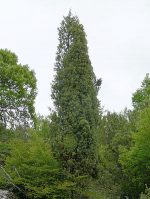 Native to dry rocky areas of the mountains in Syria, Lebanon, Antilebanons, Galilee, Gilead, and Bashan, this coniferous evergreen is the eastern form of J. oxycedrus which some authorities consider a distinct species. It is a member of the cypress family, Cupressaceae, that also includes arborvitae and redwood. Plants can be a prostrate or spreading shrub 6-10′ tall or a small tree up to 20′ tall with a bushy, irregular crown, spreading to upright branches with drooping tips, and thin gray bark that peels into longitudinal strips. The green needle-like leaves are whorled and carried in clusters of three. The leaves are 0.39–0.79′ long, broad-based, and have a double white stomatal band split by a green midrib on the inner surface. Male and female cones are borne on different plants and have raised scale edges. The pollen cones are yellow, obovate and .o4-.o8′ across. They appear singly on very short stalks in the leaf axils, have 4-8 alternating trios of pollen scales, and shed their pollen from late winter to early spring. The spherical berry-like seed cones are .28-.48 across and have 3-6 fused scales in 1-2 whorls, three of which carry an single seed. The seed cones are green when young but become orange-red with a pink waxy coating as they ripen for 18 months. Birds ingest the cones, digest the fleshy scales, and pass the hard brown seeds in their droppings. Photo Credit Wikipedia
Native to dry rocky areas of the mountains in Syria, Lebanon, Antilebanons, Galilee, Gilead, and Bashan, this coniferous evergreen is the eastern form of J. oxycedrus which some authorities consider a distinct species. It is a member of the cypress family, Cupressaceae, that also includes arborvitae and redwood. Plants can be a prostrate or spreading shrub 6-10′ tall or a small tree up to 20′ tall with a bushy, irregular crown, spreading to upright branches with drooping tips, and thin gray bark that peels into longitudinal strips. The green needle-like leaves are whorled and carried in clusters of three. The leaves are 0.39–0.79′ long, broad-based, and have a double white stomatal band split by a green midrib on the inner surface. Male and female cones are borne on different plants and have raised scale edges. The pollen cones are yellow, obovate and .o4-.o8′ across. They appear singly on very short stalks in the leaf axils, have 4-8 alternating trios of pollen scales, and shed their pollen from late winter to early spring. The spherical berry-like seed cones are .28-.48 across and have 3-6 fused scales in 1-2 whorls, three of which carry an single seed. The seed cones are green when young but become orange-red with a pink waxy coating as they ripen for 18 months. Birds ingest the cones, digest the fleshy scales, and pass the hard brown seeds in their droppings. Photo Credit Wikipedia
The Hebrew words ar-ar and aro-er or aro’air, is usually translated heath but probably did not refer to true heaths as most heaths do not occur in Palestine. Most authorities believe the plant intended was either prickly juniper which inhabits the most barren and rocky parts of the desert or Phonecian juniper (Juniperus phoenicia) that has very small scale-like leaves and grows on the west side of the mountains of Edom.
Jeremiah 17:6 (KJV) The prophet decries anyone who trusts a fallible man.
“For he shall be like the heath in the desert, and shall not see when good cometh; but shall inhabit the parched places in the wilderness, in a salt land and not inhabited.”
Jeremiah 48:6 (KJV) The prophet warns of the impending judgement against the cities of Moab.
“Flee, save your lives, and be like the heath in the wilderness.”
J. deltoides like full sun and average, medium moist, well drained, neutral to slightly alkaline soil in USDA Hardiness Zones 8-10 but survives chalky soil and are healthy with no significant pests or diseases. Propagation is by cold stratified seed, hardwood cuttings, and layering. Plants are heat and drought tolerant, attract birds and are useful as a screen, specimen or for erosion control or a rock garden.
The genus name, Juniperus, is the ancient Latin name for the plant. The specific epithet, deltoides, is from the Greek letter delta, that is triangular in shape.